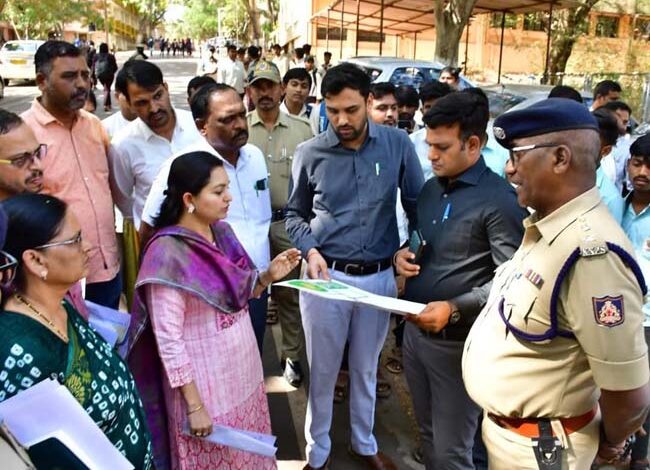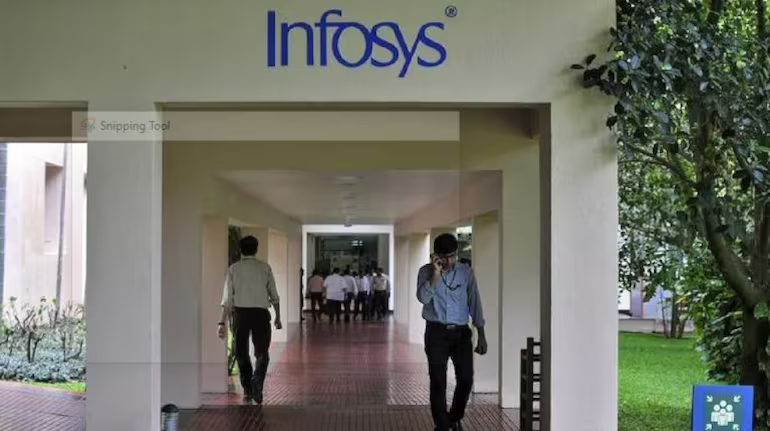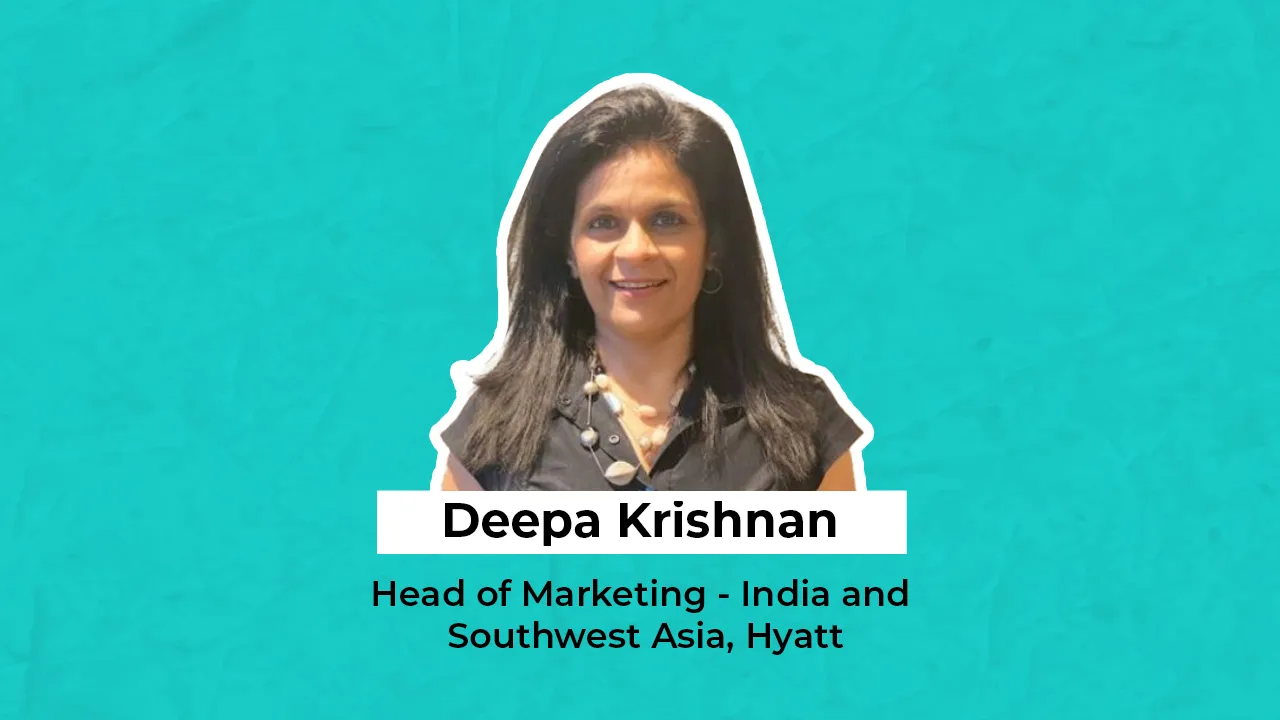Deepa Krishnan, Marketing Head at Hyatt India and Southwest Asia, shares insights into her leadership journey, key milestones, inclusivity efforts, and mentorship for women leaders.
In the early stages of her career, Deepa Krishnan found herself in rooms where her voice was often overlooked, a lone woman navigating male-dominated conferences and corporate spaces. There were moments when colleagues found it more comfortable speaking to junior male counterparts, challenging her to make her voice heard in spaces that were not naturally welcoming.
Her journey across diverse industries, from Godrej Appliances to Tata Starbucks and now Hyatt, wasn’t just about climbing corporate ladders but about understanding a fundamental marketing truth. Krishnan shares that the core principle is to “obsess about the customer, not your competitor,” a philosophy that has been her career’s guiding star. It allowed her to turn challenges into opportunities, develop initiatives like India’s first rural refrigerator and lead marketing strategies for global brands.
She believes that taking risks is crucial, and brands lose consumer interest when they play it safe. Her experiences taught her that marketing success comes from solving genuine business problems and staying true to core values.
Today, as the Marketing Head for Hyatt in India and Southwest Asia, Krishnan embodies the very principles she championed throughout her career. In this interview, she shares her vision of becoming one of the most loved brands across all industries, not just hospitality. Krishnan takes us through her day as a marketing leader at Hyatt, milestones, lessons learnt, fostering inclusivity, and mentorship for women leaders.
Edited Excerpts:
You have worked across diverse industries—hospitality, retail, FMCG, telecom, and consulting. How have these experiences shaped your perspective as a marketer?
One key lesson from working across diverse industries is that while they may be different, the fundamentals of marketing remain the same. Certain principles never go out of style, though they must be adapted to the specific industry.
The first and most important principle is staying consumer-focused. Rather than trying to outdo or imitate competitors, it’s always more effective to prioritise the customer. Jeff Bezos famously said, “Obsess about the customer, not your competitor.” That mantra has stayed with me throughout my career. Industries may change, but customer obsession should remain constant.
Second, authenticity is essential. Brands should stay true to their core values instead of chasing fleeting trends. Just because something is popular in the market doesn’t mean it’s right for your brand. Long-term success comes from consistency and authenticity.
Third, taking risks is crucial. If you don’t push the envelope, you’ll end up repeating the same strategies, which leads to stagnation. Consumers lose interest when brands play it safe. Innovation and bold decision-making keep both the brand and the audience engaged.
Every industry has its own nuances; hospitality differs from retail, which differs from appliances or consumer durables. However, these three principles apply universally.
Lastly, marketing should always solve a business problem rather than simply create a campaign. A campaign, no matter how creative, is ineffective if it doesn’t drive tangible business results. More than ever, marketing is an ROI-driven function.
From your early days at Godrej Appliances to leading marketing at Hyatt, what have been some of the key milestones in your journey?
My time at Godrej Appliances marked the beginning of my career, and I had some incredible mentors. Godrej is a fantastic organisation, highly professional and respectful of its employees. That role, where I supported my leader in marketing and new product development, was a significant turning point for me.
One of the most memorable projects was developing India’s first rural refrigerator, Chhotu Cool. It was a proud moment to be part of an initiative that showcased how an Indian brand could stand strong despite increasing competition from Western brands entering the market.
Another major milestone was my time at The Futures Company, a part of WPP. There, I had the privilege of working with some of the world’s most renowned brands, solving large business challenges such as identifying the next big growth opportunity, positioning brands effectively, and planning for various business scenarios. This experience was transformative for two reasons: first, it gave me exposure to multiple industries and strategic problem-solving at a high level; second, I worked with an exceptionally talented team of strategic and creative individuals.
The next turning point in my career was my role at Tata Starbucks, where I was the CMO, leading marketing, category management, loyalty, and digital. The challenge of growing a globally beloved brand in India was both exciting and rewarding. Many international brands struggle to replicate their success in India, so the key was unlocking the right formula for the Indian market. That journey was a significant learning experience.
I believe the best is always the present. It is an honor and privilege to be working with an incredible, purpose-driven brand like Hyatt. Our philosophy, ‘We care for people so they can be their best,’ truly resonates with me. When you work for a brand where care is at the heart of everything, and it aligns with your passion, in my case, travel, life couldn’t be better.
Having worked with global brands like Diageo, Starbucks, and Hyatt, how do you balance global marketing strategies with local consumer insights?
I believe the reason these brands are successful is their ability to strike the right balance between what works at a global level and what needs to be adapted for local markets. That’s the key to their success.
When working for a multinational organisation, there must be a strong framework in place, one that defines the brand identity and purpose. This framework is deeply embedded in the DNA of everyone who works there. For example, whether you visit a Hyatt in Delhi, Mumbai, Melbourne, or Chicago, the essence of the brand should remain consistent. The soul of the brand must be the same everywhere, and that is achieved through strong guidelines that shape all aspects of the business.
Within this framework, a significant amount of work is tailored to the local market. In the case of Hyatt in India and Southwest Asia, where I lead marketing, I’d say a large portion, 90% or more, of our initiatives are locally driven. Whether it’s the F&B campaigns we’ve launched, the “Perfectly Yours” wedding IP we’ve developed, or the recent launch of our Hyatt India Instagram page, all of these are led by our local office while staying aligned with regional and global partners.
Increasingly, multinationals recognise that to succeed in local markets; you must think global but act and ultimately think local.
What does a typical day as the Marketing Head of Hyatt look like? What are some things that keep you motivated and some things that you look forward to?
My day is crazy, intense, and fast-paced, but also incredibly exciting, fun, and full of passion.
I’m a big planner, both in my personal and professional life. I like to have a clear roadmap and be fully aware of what I want to achieve throughout the year. It all starts with a strong vision, and at Hyatt, my role is very clear. The vision that drives us every day is to become one of the most loved brands in Southwest Asia. I don’t just mean in the hospitality sector; I mean one of the most loved brands across all industries. That’s the goal we wake up to every day.
It’s about ensuring that every action we take contributes to that vision. Whether it’s an important piece of communication, an innovation in guest experience, or a strategic partnership, I focus on making progress toward that larger goal.
A big part of my day involves driving our digital-first approach, whether it’s working on transformational initiatives in loyalty programs or enhancing our communication strategies. I measure progress by ensuring that each step we take is meaningful and impactful.
Like in any leadership role, meetings take up a significant portion of my day. But what truly excites me amidst all the chaos is brainstorming new ideas with my team. I’m fortunate to work with incredibly passionate individuals who are instrumental in shaping our strategies.
I also spend time tracking industry trends, staying connected with guests and stakeholders, and ensuring we always have a pulse on the market.
What are some challenges you faced in your career that you hope future women in the industry won’t have to encounter?
I don’t want to limit this to just one industry because every industry and company is ultimately a reflection of society, and we still have a long way to go.
Early in my career, I often found myself as the only woman in the room. There were moments when people found it easier to speak to a junior male colleague instead of me, or I’d be one of only three women in a room of 500 at a dealer conference, where many weren’t comfortable engaging with me directly. Yet, I had to navigate these spaces, get my work done, and make my voice heard.
But things have changed and continue to change. The workplace isn’t isolated from societal progress.
True change happens when women at home, whether mothers, wives, daughters, or sisters, are given the support to pursue their dreams and are no longer expected to take a back seat. When this shift happens in homes, it naturally reflects in workplaces too.
I’m happy to see that the hospitality industry has made great strides in this regard. At Hyatt, we have over 100 women in senior positions across the organisation. We also have women leaders in corporate roles, heading multiple teams and serving as general managers at various properties.
Ultimately, when 50% of the population and 50% of consumers are women, there is no reason why we shouldn’t see far more women in leadership roles across industries.
Women in the advertising and marketing industry often face biases—what has been your experience, and how do you think workplaces can foster a more inclusive environment?
One of the biggest points where women tend to drop out of their careers is marriage, motherhood, or caregiving responsibilities, whether for elderly parents or children at critical academic stages. In my experience, these moments often determine whether a woman continues her career or steps back.
That’s why organisations need to provide support not just for women but for people in general. Men play an equal role in raising children, and many companies today offer paternal leave and family-friendly policies. As a society, we must recognise and support individuals through these key life transitions.
The second critical factor is visibility and mentorship. When women see other women in leadership positions, it provides inspiration and validation. Many successful women have navigated self-doubt, guilt, and tough choices about balancing family and career.
I’ve personally faced moments where I questioned whether I should step back from work to focus on my kids, fearing I’d regret not giving them enough time. But I was fortunate to have support systems that helped me push through.
At Hyatt, we have a platform called Women at Hyatt, where women leaders come together to discuss challenges, share experiences, and support each other. Initiatives like these create safe spaces where women see role models who have walked the same path, proving that success and personal life can coexist.
Finally, true inclusion requires allyship. No gender can succeed in isolation. Men must be part of this conversation, and we should never create an environment where they feel excluded. The goal isn’t to shift the balance one way or another but to build workplaces where everyone, men and women, supports each other’s growth.
The good news? Change is happening. We’re seeing more women break the glass ceiling across industries like finance, hospitality, marketing, and advertising. Many women today lead agencies, brands, and organisations as CEOs, proof that progress is here to stay.
As a senior leader, how do you mentor and support women who aspire to have leadership roles in marketing?
I mentor aspiring women in marketing by sharing the key lessons I’ve learned throughout my career.
First and foremost, you don’t need to behave like a man to be a successful woman leader. Own your feminine energy; qualities like grace, empathy, and emotional intelligence are strengths, not weaknesses. Leadership doesn’t require changing who you are; it requires embracing what makes you unique.
Second, let go of the perfectionist mindset. One of the biggest challenges I see among women is that we hesitate to put ourselves forward unless we feel 120% ready. Meanwhile, many men will raise their hands when they’re just 40% sure. This mindset holds women back from opportunities that could help them grow. Don’t wait for perfection, learn on the job.
Third, claim your seat at the table. As Sheryl Sandberg famously said in ‘Lean In’, women need to actively participate, speak up, and network. Too often, we focus on working hard in silence, hoping that our results will speak for themselves.
But career growth also comes from building relationships, making your voice heard, and forming a strong support system.
Lastly, hard work, passion, and perseverance are non-negotiable. There will be tough phases in any career, moments when you question everything. But if you truly love what you do, you’ll find a way to push through and succeed.
What key skills and qualities do you look for when building your marketing team?
The first thing I look for is whether they are the best advocate for the guest or the consumer. I firmly believe that a marketing team must be the voice of the consumer. Are they consumer-focused, or are they being led by other factors? This is a crucial quality I seek.
The second thing I assess is their strategic thinking. As I’ve said, the role of marketing is to solve business problems. A brand is truly successful when people are willing to pay a premium for it, which only happens when marketing efforts align with business goals and maintain a strong consumer focus.
Third, I look for passion. We spend more time at work than with our families, so if you’re not passionate about what you do, what’s the point? Passion drives commitment and innovation.
Fourth, I value independent thinkers. I don’t want team members who simply say yes to everything. I want people who challenge the status quo and bring fresh perspectives. Sycophancy is something I strongly dislike, I need team members who can think for themselves and voice their opinions.
Finally, I look for a little bit of madness because what’s life without it? Creativity, boldness, and a willingness to take risks are what make marketing exciting and impactful.
The role of a marketer is evolving rapidly with AI, data analytics, and changing consumer behaviour. What skills do you think will define the next-generation marketer?
I believe the next-generation marketer must excel at understanding and leveraging data. The ability to make data your best friend will be crucial. With AI and an abundance of data, marketers can now move toward hyper-personalised, segment-of-one targeting. The way a brand speaks to one individual should be completely different from how it speaks to another, and this level of personalisation is already becoming the norm.
However, the challenge lies in digesting and acting on all this information. Can your communication be tailored dynamically for different audiences? Can your entire marketing funnel activation be uniquely optimised for different consumer segments?
The skill set required will be a fusion of technology and creativity. A sharp understanding of analytics will be indispensable, but equally important is the ability to navigate uncertainty and ambiguity. Over the next five to ten years, and likely beyond, the pace of change will be seismic.
Marketers who struggle with uncertainty may find it difficult to keep up. Instead, the most successful professionals will be those who can adapt, evolve, and ride the wave of change, much like a surfer. You will inevitably be knocked underwater at times, but the key is whether you can get back up, read the next wave, and stay on top of the game.
What do you see as the biggest shift in customer engagement strategies today?
One major shift is the evolution of consumer segmentation. While everyone has access to data today, the key differentiator is how effectively you use it. Traditional demographic and psychographic profiling is no longer sufficient; segmentation is becoming far more nuanced and complex. The ability to leverage technology to create highly precise consumer segments will be critical.
Ironically, the second shift is the increased importance of storytelling. In an era when consumer attention spans have dropped to eight seconds and may shrink further to two seconds in the next five years, the challenge is how to hook consumers instantly. Marketers need to return to the foundations of storytelling, crafting emotionally compelling narratives that resonate deeply with their audience.
Finally, amid these rapid advancements in technology, analytics, and data-driven marketing, brands must ensure they don’t lose their identity. The real challenge lies in balancing technology, storytelling, and analytics while maintaining a strong, authentic brand presence.
In high-pressure roles, self-care often takes a backseat. How do you prioritise work-life balance and personal well-being while leading large marketing teams?I believe I’m fortunate to have a ‘switch-on, switch-off’ mentality when I’m at work; I’m fully engaged, and when I leave, I can completely disconnect. This ability to compartmentalise has been crucial in maintaining balance.
I make it a priority to set aside daily time for myself, whether it’s swimming, going to the gym, or engaging in any activity that helps me recharge. I strongly believe that if you don’t take care of yourself, you can’t sustain the pressures of leadership.
Lastly, I live by a ‘work hard, play hard’ philosophy. I ensure I take long breaks and vacations, exploring new places and disconnecting from work completely. These moments of rest and exploration help me return refreshed and re-energised.
Have you had mentors or role models who played a pivotal role in your career? How did their guidance influence your leadership style?
Every major turning point in my career has been shaped by remarkable leaders who have influenced my approach to leadership.
My first significant mentor was Shyam Motwani during my time at Godrej Appliances. His leadership was all about impact and execution. He never shied away from tough conversations, teaching me that leadership isn’t about being popular, it’s about doing the right thing. Popularity, if it comes, is a byproduct of that integrity.
Another pivotal mentor was Rima Gupta, my first woman leader. From her, I learned that empathy and decisiveness can go hand in hand. She showed me that as a woman, you don’t need to change yourself to succeed in a male-dominated environment; you can lead with both strength and kindness.
At Tata Starbucks, I was fortunate to work with Navin Gurnaney, our then-CEO. He was probably the biggest feminist I’ve ever met—often advocating for women even before they recognised a bias themselves. His commitment to equity and fairness left a lasting impression on me.
Now at Hyatt, I continue to learn from incredible leaders and colleagues every day. I feel truly blessed to have had such inspiring mentors throughout my journey.
Source:
https://www.socialsamosa.com/interviews/women-in-leadership-positions-hyatt-deepa-krishnan-8893389




















